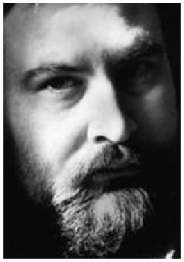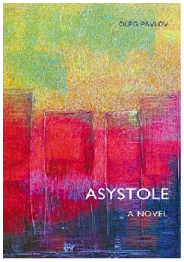| | | One Russian reviewer noted that Oleg Pavlov’s Asystole was teaching readers not to speed-read. It is a complex, stream-of-consciousness narrative of the “seeing” of a dying man, a talented artist whose career has been wrecked. With the arrival of the New Russian way of doing business, his studio and its entire contents are swept away by developers. His beady artist’s eye causes many problems with the love of his life, who finds his drawings of her pornographic, and a possessive widowed mother adds to his problems. As Russian democracy is battered by Yeltsin’s tanks he gives shelter to a protester, who goes on to greater things as the hero succumbs to chronic depression.
Pavlov’s writing is dense with poetic imagery. An unusual novel we think you will enjoy.
Excerpts from Asystole
The mother
“Mummy, where’s Daddy?”
Enormous eyes. Neither pity nor fear. She takes him by the hand and leads him away to a small room. Muffled sounds. No one will hear. She whispers as hard as she can, “Daddy is not here any more. He has died.” At the moment he heard that he wanted to smile. He wanted his mummy to go back to being kind again, but she squeezed his hand painfully and said, “Remember, Daddy loved you very, very much!” Her invincible face was suddenly broken by a twitching, purple grimace. It looked old and flabby, and she frowned, terribly wounded by everything in the world. A visceral groan through her teeth before, a moment later, she put on a proud look and said in a clear, calm, but trembling voice, “Now we need to go and look after our guests.”
The wife
She inspects his drawing as if it is of someone else. Not her, but his secret. The excitement of jealousy is dispelled by the neutrality of recognition. She seems to be looking in a distorting mirror, but the other face fills with distaste and hardens like the mask of an African idol. She is offended, and offensive in retaliation: I don’t look like that. It’s like pornography. It’s disgusting. She tries nevertheless to extract an acknowledgement, to catch him out. Do I look like that? And then, in retaliation, “You don’t love me.”
The artist
Leaving his belongings, he went for a final walk, suddenly finding an abyss behind the little museum. It was an abyss into which the lake, the forest, and the sky had capsized. Everything was naked and hungry, which it had not been even a week before when he last stood here. Now, he saw himself above a precipice which had swallowed everything, even time itself, and was still hungry. The wind was howling down there, black water shimmering, but it was too late. It had been painful to tear himself away. He could only store it in his memory. He felt he had never seen anything like it. He wanted to come back the next year; he had been looking forward to it, but something had got in the way. After that they were short of money, and after that he forgot all about it.
November. Just one day, even one hour, when this had been visible. Yesterday it had been too late to go there, but here it was, so near. Without saying anything, he invited Sasha to come for a walk with him, and they slowly headed in that direction. At the very spot where he had stood, afraid of toppling, of falling down under the foundations of the museum, they found, sitting in front of her easel on a folding seat, Antonina. She thought they had come to see her, to look at her work, and asked hesitantly, “What do you think?” He saw flatness, but not on the canvas, right in front of him. Pretty clouds, flowers, greenery. Drapery. Instead of a vase there was a lake. It was feather-brained. She had a vacuum flask of tea to hand. |

